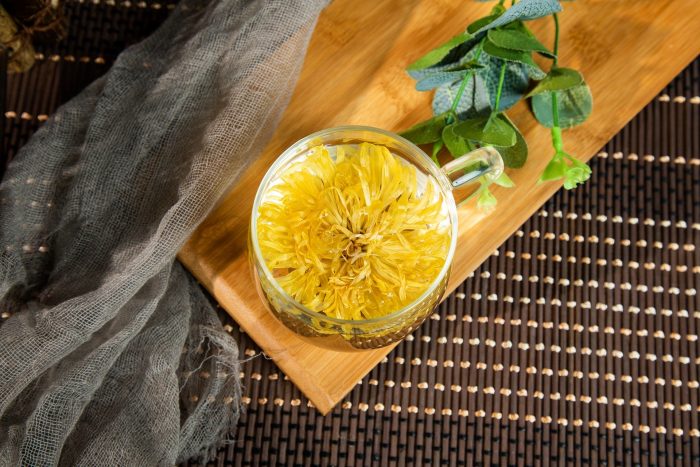Editor’s Note: Elephant is not your doctor or hospital. Our lawyers would say “this website is not designed to, and should not be construed to provide medical advice, professional diagnosis, opinion, or treatment to you or any other individual, and is not intended as a substitute for medical or professional care and treatment. Always consult a health professional before trying out new home therapies or changing your diet.” But we can’t afford lawyers, and you knew all that.
~
A heat advisory is in effect in many parts of the world right now.
Yesterday, where I live, it was a record-breaking 98F, and today, the heatwave persisted at 96F.
Everyone is desperately looking for ways to cool down, from staying indoors to hydrating with watermelon. Besides choosing cooling foods, some easily accessible TCM (traditional Chinese medicine) herbs can also be brewed into tea to help us cool down.
One of my all-time favorites is chrysanthemum flower tea.
Chrysanthemum flower is a Chinese herb with a slightly bitter taste and cooling properties. This little flower is a nutrient powerhouse. It contains a variety of amino acids, various vitamins including A, Bs, C, and K, and minerals such as calcium, magnesium, iron, and potassium. Its bittersweet flavor is subtle yet soothing. This herb can effectively clear heat and release toxins from the body.
Here are its benefits:
1. It clears heat.
Used for its effects of cooling summer heat, chrysanthemum tea is a popular staple in Asia during the hot summer months. The yellow variety of chrysanthemum has a strong cooling effect. It can soothe symptoms of sore throats, fevers, and headaches caused by the “wind-heat” stage of a cold. So do be mindful if you have a “cool” constitution and/or weak digestion, and consult your acupuncturist or herbalist.
2. It benefits the eyes.
With its impressive vitamin content, Chrysanthemum can improve eyesight and support liver meridian health. It’s perfect for summer days spent under the blazing sun. The white variety of chrysanthemum is best used for this purpose. It is frequently combined with goji berries to brew tea for improving eyesight and treating blurry vision. Its anti-inflammatory properties can also ease eye swelling and red eyes.
3. It’s a powerful antioxidant and improves the skin.
A 2018 study showed that chrysanthemum flowers contain potent antioxidant compounds. Another 2019 study found that this little flower contains high levels of flavonoids, which help the human body to fight off free radicals and regulate cell activity. What this means is that chrysanthemum has anti-aging, antitumor, neuroprotective, and hepatoprotective effects.
The high contents of vitamins and flavonoids can reduce wrinkles and help with cellular repair after sun exposure. Its anti-inflammatory properties also calm skin irritation, speed up skin healing time, and reduce swelling and puffiness. In fact, It has been used to treat skin conditions such as acne and eczema in China for hundreds of years.
4. It lowers high blood pressure.
Chrysanthemum has also been shown to have cardioprotective effects and has been used in Chinese Medicine to help reduce hypertension and improve heart health. Its high content of Vitamin K supports bone and cardiovascular health. It also has a calming, sedative effect that can help quiet the mind and ease anxiety and anger.
5. It supports bone health.
Similarly, with its high content of Vitamin K and minerals (calcium, magnesium, iron, potassium), they work together to improve bone health. In other research, it was also found that chrysanthemum has a potential therapeutic role in bone-related disorders.
How to brew the tea:
>> Make sure to purchase from a reliable organic source.
>> Add a handful of chrysanthemum flowers to mug (roughly 10 flower heads).
>> Optional: add roughly 10 pieces of goji berries.
>> Bring water to a boil and pour into the mug.
>> Steep tea for 10 minutes and it’s now ready to be served!
Author’s note: Please consult with your acupuncturist or other healthcare providers before using any herbs therapeutically, and if you are pregnant. If you are allergic to chrysanthemums or ragweed, do not take this herb.







Read 3 comments and reply